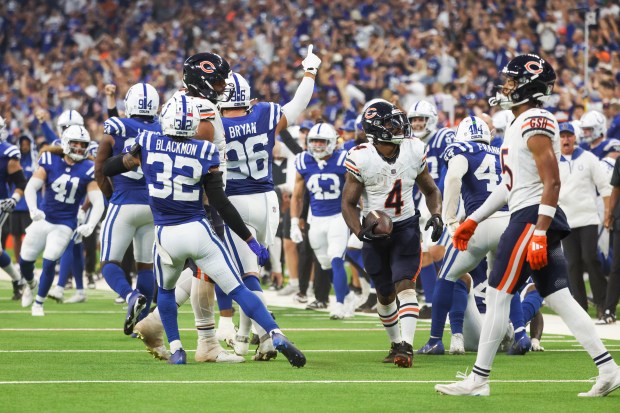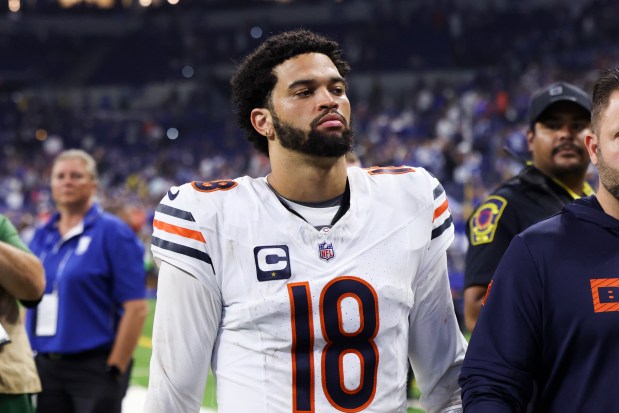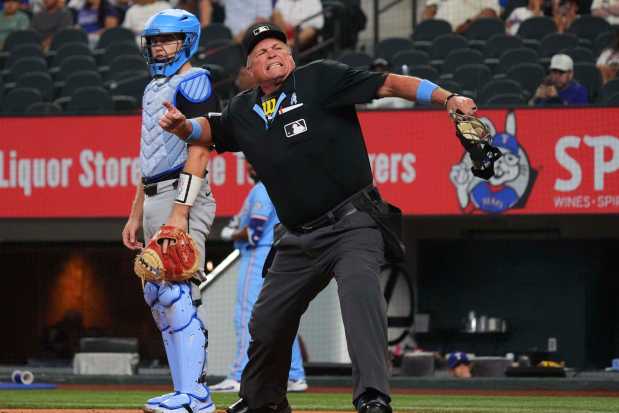Understanding that the development of Caleb Williams is at or near the top of Shane Waldron’s job description, the Chicago Bears can share optimism in the fact the rookie quarterback has improved each of the last two weeks.
Williams’ completion percentage, yards and yards per attempt have increased in the two losses since the season-opening victory against the Tennessee Titans, and he’s coming off a 363-yard effort against the Colts on Sunday in Indianapolis that included two touchdown passes.
Williams looks to be improving incrementally, and while it’s never going to be a linear progression, he already looks more comfortable than any Bears rookie quarterback has in a long time.
“There’s a lot of new as we all know,” Williams said. “Wide receivers, running backs, quarterback, the offensive linemen and all these different parts. Us constantly having the encouragement mindset, but also the positivity that we see on the actual film — if you actually watch it and not get into all the emotions of the game.
“Yes, we do need to get it going a little bit more efficiently than we are. But the growth and positivity that we have within the film that we’ve seen and things like that over these past couple of weeks (is encouraging).”
The overall picture for the offense, though, has been murky — to put it nicely. Waldron’s unit has struggled to form any kind of identity. The offense has been particularly bad in a handful of areas and hasn’t scored enough. It’s a familiar movie and without improvements will offer a familiar ending.
The Bears have three offensive touchdowns, tying them for last in the NFL with the Denver Broncos, Miami Dolphins, New England Patriots and Pittsburgh Steelers. The Philadelphia Eagles have yet to score in the first quarter this season. The Bears and Sunday’s opponent at Soldier Field, the Los Angeles Rams, are next worst with three points each.
Asked if he uses a play script to begin games, Waldron labeled that “scheme” related during a fast-talking, 15-minute news conference Thursday morning. It’s worth noting the Bears are No. 2 in the league in fourth-quarter scoring with 30 points.
Coming off a rough showing in the 21-16 loss to the Colts, Waldron opened with a statement complimenting the team’s leadership group for being solution-oriented. Interestingly, one player said Waldron was more engaged seeking player input this week. If you heard a coach or player mention communication since Monday, you’ve heard it 100 times.
Veteran Marcedes Lewis is one of the players Waldron credited, along with fellow tight end Cole Kmet, Williams and wide receiver DJ Moore.
“Don’t feel like he can’t point guys out,” Lewis, 40, recalled saying to Waldron. “From the oldest guy in the room — being me — to the youngest guy. Don’t feel like you can’t coach us. I want to be coached. I want to be great. This is not for play. This is our job. We understand that. It’s a highly stressful, production-based business, and we’ve all got to be doing the same things or everybody gets fired. Ego is supposed to be left at the door.
“He’s very receptive to that. I think, obviously, coming in, we’ve got a bunch of dudes. Not just guys on the team or on this offense. We have dudes — dudes who have done it at a high level. Sometimes as the coach coming in, you might be walking on eggshells. I just kind of put that to bed. Nobody’s sensitive in here. We want to win games just as bad as you do. It’s a collaborative effort. This is not Pop Warner.”
To be fair, Williams was probably going to have to look like a two-time Pro Bowl selection from the jump to meet some of the audacious expectations put on this offense. Folks dared to dream — and dream big — when the Bears chose him with the No. 1 pick in the draft, the most decorated quarterback to join the franchise in decades and the greatest signal of hope to enter Halas Hall perhaps ever.
Predictably, Williams has encountered challenges that make the position difficult to navigate for rookie starters, including myriad pressures and a mixing of coverages with the intent to fool him or cause a delay in his reaction.
All of that was expected, but the cast of players surrounding Williams, perhaps as good or better than almost any rookie starter has discovered in the last decade or two, was supposed to ease the transition. The Bears invested heavily on offense in the offseason, trading for wide receiver Keenan Allen, who has missed the last two games with plantar fasciitis, drafting receiver Rome Odunze with the No. 9 pick and signing running back D’Andre Swift and tight end Gerald Everett in free agency to join a cast that already included Moore, Kmet and a functional collection of running backs.
Early results — and a lot of football remains — have been discouraging.

- Pass protection remains an issue. Williams has been sacked 13 times, the same number Justin Fields took through three games a year ago. Only the Cleveland Browns (16) and Tennessee Titans (15) have surrendered more. The line was supposed to look better with a quarterback that could play within the structure of the system a greater percentage of the time. Simply put, it has not.
- The run game has been a mess. The failed goal-line sequence in the second quarter Sunday — when the Bears started with first-and-goal from the 4-yard line — is the symbol of what has gone wrong. Poor execution. Poor design — there’s no other way to describe a play in which wide receiver DeAndre Carter is asked to block a defensive end. Waldron owned that when asked specifically about it. Poor decisions both in the speed option on fourth-and-1 and the failure to check out of the play.
The Bears are 31st in rushing offense, averaging 72.7 yards per game, and 31st in yards per attempt at a meager 3.03. The Las Vegas Raiders are the only team worse in both categories. The ground attack was expected to take a hit with the departure of Fields, whose ability to threaten defenses inflated rushing production the last two seasons, but it wasn’t expected to be this bad.
- First down hasn’t been profitable. The offense ranks 29th in the league, averaging 4.26 yards on first-and-10. So, they’re not in desirable second-and-short situations with a lot of regularity, and when they’re playing behind the sticks, it’s tough sledding. According to @SharpFootball, 64% of Bears’ first downs reach third down, the highest percentage in the league. The NFL average is 47%, and only three teams are over 57%. All of that makes it easier for opposing defensive coordinators to make calls on second and third downs.
- Explosive plays have been scarce. The Bears have five runs of 10 yards or more. Three are the result of Williams’ scrambles, and Moore had a 14-yard gain on a jet sweep. The lone explosive rush by a running back was Swift’s 20-yard carry in the Week 1 win against the Titans. The Bears have had only four pass plays of 20 yards or more — three to Odunze and the 44-yard Hail Mary to Moore last week that came 1 yard short of the goal line before halftime.
Former Bears defensive coordinator Ron Rivera used to say, “figures lie and liars figure,” but you really need to spend time crunching numbers to paint a pretty picture of the offense overall. Again, it has been only three games.
“I’m not going to live in the past but I’m going to learn from it,” Waldron said. “I’m going to move forward. And I believe in that. I’m not going to flinch or blink on any of those things. I’m looking forward for a solution to everything that we’ve been through and can’t wait for the next game.”
The offensive coordinator taking heat even at this early juncture isn’t surprising. The play caller can become the target of ire faster than you can say “three Mississippi.” Waldron is the franchise’s 13th coordinator in 26 seasons, and things turned so quickly for predecessor Luke Getsy that in about two months he went from being a guy fans feared was so hot he would be leaving quickly to become a head coach after the Bears averaged 29.6 points in a five-game stretch to the guy who was to blame for the offense’s incompetence.
Waldron is standing up in front of players expressing where he needs to be better. He’s being accountable to his players and listening to them. It was a tough outing overall against a Colts defense that otherwise hasn’t played well.
It would appear there are spots for improvement — although that was a good storyline at this time a week ago. The next four opponents have been as bad on defense as some of the areas the Bears have struggled offensively.
- Sunday: Rams 32nd in yards allowed, 31st in scoring
- Oct. 6: Panthers 24th, 32nd
- Oct. 13: Jaguars 26th, 28th
- Oct. 27, Commanders 29th, 29th
Something has to give, right?
“He stands up there and lists the plays that he could have called better,” Lewis said. “Puts it up on the board. We all see it. And I think that’s the best way to do it. I mean, we’re not kids, right? We respect that. Because everything is evaluated, especially from a player’s standpoint.
“We know we’re getting evaluated with whatever we’re doing out there. So when a coach throws himself in that pot of gumbo, then we’re all vested, we all have some skin in the game. He’s been doing that and highly appreciate it.”
We’ll see if all the communication is a means to improvement — or just more talk.




